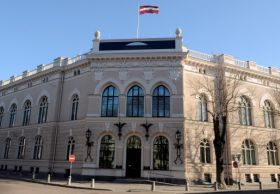Analytics, Inflation, Latvia, Markets and Companies
International Internet Magazine. Baltic States news & analytics
Tuesday, 23.04.2024, 18:10
Bank of Latvia: impact of inflation raising factors will increase in the coming months
 Print version
Print version |
|---|
In May 2016, Latvian consumer prices rose 0.6% from a month before and declined 0.8% over the year, according to the latest data from the Central Statistical Bureau (CSB). During the last 12 months, consumer prices moved down 0.2% as compared to the previous 12 months in May.
The economist said that the month-on-month price rise in May was primarily a result of the seasonal changes in the prices of several goods, as well as the rise in fixed line services and changes in fuel prices.
"Food prices in Latvia currently seem to be a reflection of the trend in the rise of prices of foodstuffs and agricultural goods common to the world and the reducing impact of local factors no longer seems topical. For instance, the average prices of dairy products, contrary to expectations (after Food Union announced in May that the prices of several brands would be cut in order to maintain the procurement of milk), did not drop.
Characteristic of the season, the price level of wearing apparel and footwear rose in May, yet less than last year and thus this factor did not raise the annual inflation level," said Paula.
She said that an upward adjustment was made in the flight and tourism service prices, which, both because of cost factors and sales, have experienced large and frequent fluctuations this year. The prices of telecommunications (+2.8% within a month) likewise posted a rather substantial rise.
"Even though the negative annual changes in May remained at an almost six-year record level and the delayed impact of the reduced costs of some resources is still topical, inflation is gradually going to change course in the coming months. Its further drop will be curtailed by several factors," the central bank economist said.
The economist said that supply factors, for instance, currently maintain a gradual rise in oil prices, albeit OPEC negotiations on June 2 once again ended without the expected result. "Such uncertainty results in a cautious approach among domestic energy producers and traders. For example, Latvijas Gaze in June went public with a new vision on the development of tariffs and, for the first time since the drop in tariffs that began in December 2014, expects a rise of one degree in July, i.e., back to the May level, for industrial consumers. Besides that, some heating energy producers are beginning to submit to the regulator new tariff plans, which, in the presence of lower costs of resources, would entail a slight rise in tariffs. Yet at the same time, the development of resource costs during the previous months could result in reduced tariffs for households, which are changed less frequently, only once every six months. Thus even though a lagged negative impact of cost factors remains, it could gradually shrink," she said.
Food prices also have been growing in the world for several months and the evaluation of expected stocks of the new season in June, albeit slightly improved, is lower than in the 2015/2016 season.
The economist said that it can also be expected that in different household bills, fixed components will gradually be introduced – for instance, for electrical power consumers with a very limited consumption. Similarly, the telecommunications service provider Bite has increased the tariff plans by a fixed amount, providing as an explanation the investments necessary to satisfy its clients.
"And yet, since the first half of the year is likely to have gone by under negative annual changes in consumer prices, the gradual rise in the price level under the impact of said factors in the second half of the year may not raise the average annual inflation above zero," said Paula.








 «The Baltic Course» Is Sold and Stays in Business!
«The Baltic Course» Is Sold and Stays in Business!

